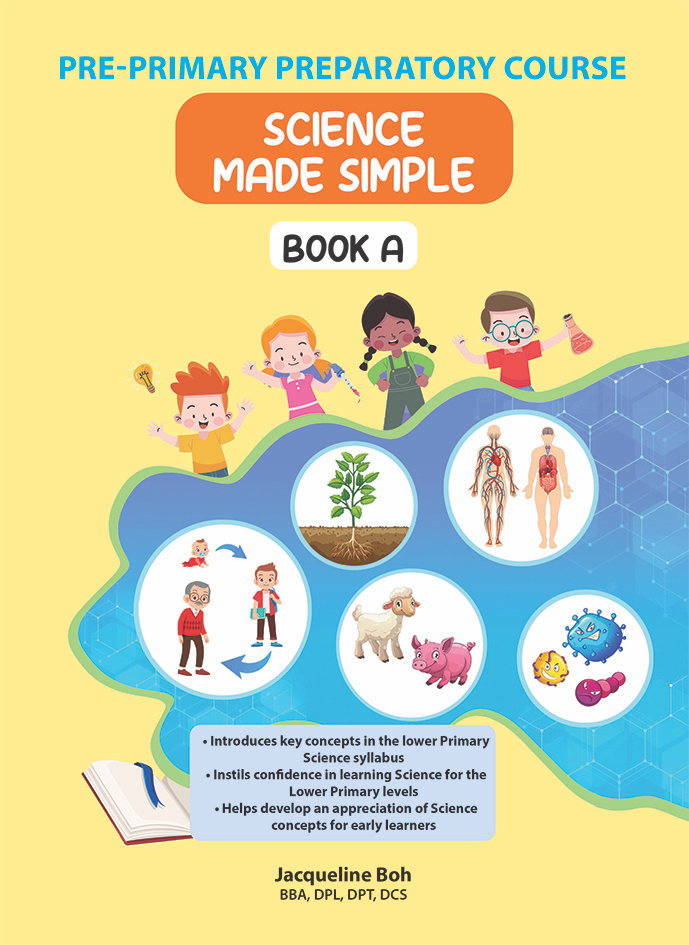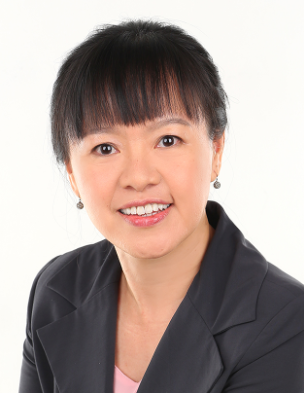Jacqueline Boh has 10 years of experience in managing two childcare centres as the Centre Director cum Principal. Besides managing the business, she was involved in teaching and curriculum development. Jacqueline has a Diploma in Preschool Teaching and Leadership. She graduated from the National University of Singapore (NUS) with a Bachelor’s degree in Business Administration and studied in the science stream in junior college. She is now pursuing her passion in educational book writing and learning material development.
Jacqueline is the author of Science Made Simple Book A. The Science Made Simple series is comprised of two books (Book A and Book B) and is designed for children to grasp all key Science concepts in the Lower Primary Science syllabus. Advanced learners from Kindergarten Two can start developing an appreciation of the Science concepts.
This series aims to help instil confidence and curiosity for deeper Science learning and exploration. All fundamental concepts required for Lower Primary Science are introduced in Book A and B. Children from Primary One and Primary Two can prepare themselves before they progress to Primary Three. After completing all practices, the books serve as examination revision notes for children in Primary Three and Primary Four.
Today, Jacqueline shares with us some thoughts about the book, as well as her experiences and advice on how parents can play a part in their children’s education.
About your book

- How will this book help young children to be more curious about learning Science?
This book introduces Science concepts in bite-sized chunks, with examples that children can relate to in their everyday experiences. To get children curious about Science, lots of visuals are incorporated so that the concepts are more relatable and familiar.
Children can learn about Science from familiar objects and concepts, and thus begin their journey of Science learning and exploration. - How do we determine if the K2 student is advanced enough to start learning Science?
It is technically never too early to learn Science as we encounter Science concepts in our everyday life. Preschoolers are learning Science in their daily activities.
However, for this Science Made Simple series, it involves reading and understanding instructions and thus as long as a K2 student can read independently, they are all set to get started on the Science series. Otherwise, parents can facilitate their children’s learning and guide them through if they need help following the instructions. - What are some simpler concepts from the series that we can begin to teach to K2 students?
Topics in Diversity are more familiar for younger children. Topics such as Living Things, Non-Living Things, Animals and Plants cover concepts or things that they encounter in their lives through their own experience, in the media or through travelling with their family. - Which topic is the hardest for young students to grasp, and why?
The human system may be challenging for young students especially since the internal organs are not visible to them. They cannot visualise how it works. For young children, they can only imagine from what they see and feel. - Are the methods in getting Primary 1 and 2 students interested in Science different from those in K2?
Children are naturally curious. However, younger children learn from their five senses. They can appreciate the topics if the concepts are familiar through their experience. Otherwise, parents can provide the real objects for their children to explore for deeper understanding.
Older children generally would have more personal experience that would give them more exposure to the various objects or topics introduced in Science. To bridge the gap, the Science Made Simple series incorporates lots of visuals and pictures for all ages to make sense of the concepts. - What are some of the common reactions from these students when they are first introduced to Science?
If children are introduced to Science learning from early childhood, it becomes very natural and easy for them to remember the scientific terms and understand the concepts which provide them with the ability to apply the concepts when they reach P3 & P4 with ease.
However, if children are not exposed to Science learning before P3, they may struggle to learn the terms in the beginning. The application of the concepts will take place after a child develops a good grasp of them. - How do we sustain their interest and curiosity for Science as they grow older, before they encounter it in school for the first time?
Parents should make Science relevant in their child’s everyday life. Don’t downplay the terms when you talk about the concepts to your child. Use the correct terms so that they become familiar with them from the start.
Make Science fun and spontaneous rather than having it be a ‘serious’ lesson. Don’t tell but let the child discover, explore and apply their knowledge in their daily lives.
About Yourself/Work/Expertise

- Can you share with us some interesting experiences from managing and developing the curriculum for your childcare centres?
When I just started out, I taught the K1 & K2 children while managing the centre, and therefore I understood their needs and challenges while developing and refining the curriculum for my 2 branches then.
We used a thematic approach while incorporating Garner’s multiple intelligences to provide a holistic development for the children. The themes were introduced by integrating language and Science concepts and thus the children had an early exposure to Science. I incorporated experiments and hands-on activities into the curriculum to make learning fun and engaging.
Parents of the graduated cohorts gave positive feedback that their children were doing well in primary school, which gave me the affirmation that the curriculum and the pedagogy was in the right direction. - Do you have any insights to share with parents of children who are in childcare?
Children are ready to learn from birth and their brain develops through active exploration and stimulation. They continue to learn through play and exploration in a safe and stimulating environment through their early years even before mainstream school.
It is important to provide the opportunities and exposure for children to try new experiences and activities as they discover their interest. Parents should take an active role in their child’s learning. Parents are in fact their child’s first educators and thus they play an important role to nurture their child’s character and attitude towards learning.
There are many ways that parents can be involved, such as by being a good role model, reading with their child often, spending time with their child and being involved in their child’s learning in school. - What are some interesting ways to excite our children’s curiosity and inquisitiveness?
Children are naturally curious. Therefore, we need to provide the opportunities for them to explore and discover. Get them to problem-solve and find the answers. Ask them lots of open-ended questions. - Are you able to share what kind of books you will be writing next?
I am in the midst of preparing another Science series that incorporates a story-based approach to teaching Science concepts and have also been working on several literacy development series.
